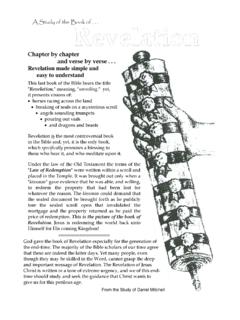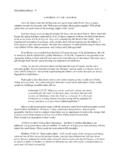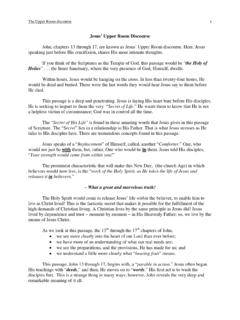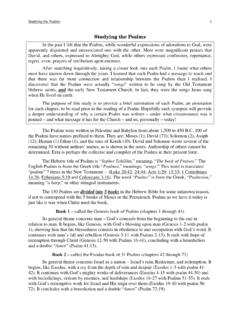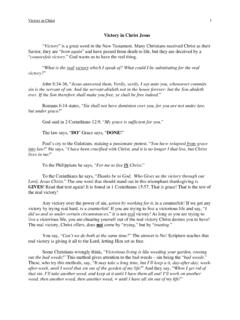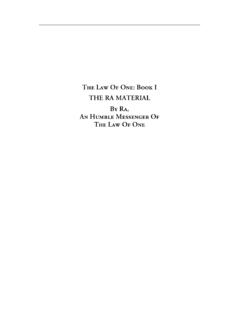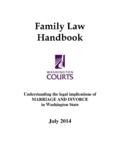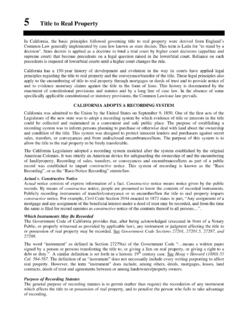Transcription of Illegal Trial of Jesus - NetBibleStudy.com
1 The Illegal Trial of Jesus 1 The Criminal- Illegal Trial of Jesus The Bible does not give the actual date of the birth, Trial or execution of Jesus . However, history does record that "on a Sunday morning, about April 4th, 30, Jesus of Nazareth's ministry was completed upon this earth." The purpose of this discourse on the criminal and Illegal Trial of Jesus is to handle the defendant as if the Galilean were but a human being. I want to make it clear that I am viewing the Trial in a legal sense only without any intent to reflect upon Christ's divinity. Every human being must believe in fair treatment toward his fellow men, and that if a man is accused of a crime, he should receive a fair and impartial Trial at the hands of whatever tribunal his case is submitted to.
2 There have been some noted criminal trials which have occurred within our life time, however, none can be compared with this Trial - and this Trial occurred within a twenty-four hour period. In all criminal cases, every defendant charged with a crime is presumed to be innocent until he is proven guilty, and this presumption of innocence must continue throughout the whole Trial . He is also entitled to every reasonable doubt, and if such reasonable doubt of guilt exists in the mind and conscience of the court, then the court must construe such doubt in the favor of the defendant - and acquit him!
3 In submitting this case, I place confidence in your honor, integrity and unbiased judgment. I will then leave the case absolutely to your fair and impartial consideration, and permit you to retire and consider the same and prepare your verdict as to whether Jesus of Nazareth received a fair and impartial Trial ? Was Jesus guilty or not guilty? The Sanhedrin was the High Court of Justice, the Supreme tribunal of the Jews, and was known to number seventy-one members. They sat as judges in the Hebrew Trial of Jesus with legislative, executive and judicial powers. They constituted the national parliament.
4 It was this court that condemned our Savior on a charge of blasphemy against Jehovah. He was tried by this tribunal under the Mosaic Code The highest, or supreme court, was this Great Sanhedrin, from which there was no appeal. Its authority was supreme in all matters - civil, criminal, political, social and religious. Since Jesus was tried for a capital offense, this was the court by which He was tried. In Israel, at the time of Christ, the Mosaic Code was the fundamental and basic written law, but there was also the Talmud containing the ancient traditions and Rabbinic interpretations.
5 The contents of the Talmud were never proclaimed to the world by the state but they were simply a mass of traditions and commentary transmitted orally through many centuries before being finally reduced to writing. The Talmud, translated into English, comprises some 400 average size volumes. It was the provision of the Sanhedrin, the Supreme tribunal, under the Mosaic Code The Illegal Trial of Jesus 2that formed the basis of this Trial . The charge brought against the defendant, before the court of the Sanhe- drin, was "blasphemy against Jehovah." The criminal indictment brought against the defendant before Pilate and Herod, was "treason against the government of Rome.
6 " Let's analyze and determine whether either the charge or indictment was properly made or well taken, against the defendant, before these courts of Judaical justice. FIRST POINT "The Jewish law prohibited any part of legal proceedings by night. (Dupin in, " Jesus Devant Caiphe et Pilate.") Even before Jesus ' Trial began the law was broken because His arrest was Illegal . The Jewish law prohibited any part of a legal proceeding in capital offenses to take place at night, and Jesus was arrested at night. "A capital offense must be tried during the day and suspended at night" (Mishna in "Sanhedrin" ) "Criminal cases can be actd upon by the vaarious courts during the day time only.
7 " (Mendelsohn in "Criminal Jurisprudence of Ancient Hebrews" p. 112). SECOND POINT Jesus before Caiaphas was Illegal because the Law stated, "Be not a sole judge, for there is no sole judge but One." (Mishna, in "Pirke Aboth" IV 8) "An accused man must never be subjected to private or secret examination, let in his perplexity, he furnish damaging testimony against himself." (Salvado in, "Institutions de Moise" pp. 365-366). The high priest's private examination of Jesus was Illegal . That Jesus was privately examined before His regular Trial by the Sanhedrin is clear.
8 Whether the examiner was Annas or Caiaaphas is not certainly known. John alone records the private interrogation, testifying: "The high priest then asked Jesus of His disciples and of His doctrine." This interrogation, by whom- ever, was Illegal because it took place at night and was by a sole judge. THIRD POINT The indictment against Jesus was Illegal because the Law stated, "The entire criminal procedure of the Mosaic Code rest upon four rules: certainty in the indictment; publicity in the discussion; full freedom granted to the accused; and assurance against all danger of errors of testimony" (Salvador in, "Institutions de Moise" ) "The Sanhedrin could not originate charges; it could only investigate those brought before it" (Edersheim in, "Life and times of The Illegal Trial of Jesus 3 Jesus the Messiah" Vol.)
9 I. ) "The only prosecutors were the witnesses in the crime. The witnesses constituted the charge. There was no formal indictment until these witnesses spoke in the public assembly. When they spoke, and the evidence of two agreed together, it formed the legal charge, libel, or indictment." (Mendelsohn in "The Criminal Jurisprudence of the Ancient Hebrews," ) The form of the indictment was Illegal . Under Hebrew justice there was no grand jury. Leading witnesses presented charges. In addition to naming a specific crime, the indictment must allege the precise acts of the accused which constitute the specific crime.
10 Was this rule observed in framing Jesus ' indictment? Gospel records do not disclose the fact. FOURTH POINT The Law stated, "The Sanhedrin was to set from the close of the morning sacrifice to the time of the evening sacrifice." (Talmud, Jerus, Sanhedrin - Vol. I, p. 19) "No session of the court could take place before the offering of the morning sacrifice." ( Lemann in " Jesus Before the Sanhedrin." p. 109) "The morning sacrifice is offered at the dawn of day. The Sanhedrin is not to assembly until the hour after that time." (Mishna, in "Talmud, of the Perpetual Sacrifice.)
